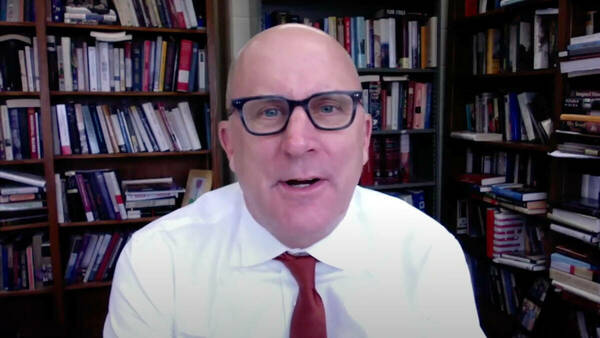
Many of liberal democracy’s most influential political theorists, including those behind the Constitution of the United States, considered Catholics untrustworthy members of the political community. The Enlightenment philosopher John Locke maintained that “no government could allow Catholics to be citizens.” Yet John Carroll, a great American Catholic hero, helped to form the very core of the Constitution and of early American political society itself—but how?
On Tuesday, November 16, 2021, the Cushwa Center and Notre Dame’s Rome Global Gateway convened a book launch discussion for Michael Breidenbach’s new monograph, Our Dear-Bought Liberty: Catholics and Religious Toleration in Early America (Harvard, 2021). Hosted by Luca Codignola-Bo (senior fellow at the Cushwa Center), the virtual event opened with discussant John McGreevy (Francis McAnaney Professor of History, Notre Dame) asking the question above and explaining that until reading Breidenbach’s book, he had not possessed a clear answer. For the first time in American historiography, Breidenbach has sought to address the question of Catholic allegiance in the colonial and early foundational periods of the United States. In asking these questions, Breidenbach has proffered a wealth of new knowledge on the Carroll family and the role of Catholics in the founding of the United States.
McGreevy noted that Our Dear-Bought Liberty has delivered a number of great contributions to the study of American Catholicism. Breidenbach has reconstructed a new history that integrates the Maryland colony and its founders, the Catholic Calvert family, into English history. In doing so, he has brought colonial American and Canadian Catholics into Western political thought and illuminated ideas of representation and the origins of “small ‘r’ republicanism,” while simultaneously engaging the story of Charles and John Carroll into the history of international, conciliar, and ultramontane Catholicism. These new approaches, McGreevy noted, represent the first time a scholar has answered the question of how Catholics like the Carrolls could be considered good citizens of the early American republic and integrated into a nominally anti-Catholic community. Breidenbach’s answer to the question is “loyalty before liberty”—Catholics demonstrated loyalty to the new American project and, in doing so, gained liberty.
During the conversation, McGreevy raised a number of questions for Breidenbach. He asked whether the Carroll family were a conciliar, republican exception amongst Catholics, or whether there were parallel individuals and movements occurring across the globe during this same period. Breidenbach thoughtfully answered that the conciliarist moment did not dictate movement on the ground and that the ecclesiastical framework of conciliarism refracted very differently in places like France and Mexico. A second question raised by McGreevy was how historians have received Our Dear-Bought Liberty’s argument that conciliarism is one of the languages of American Catholicism and constitution-making; additionally, he asked how far this idea of conciliar Catholicism really extended into the post-Second Vatican Council era. He noted that there is much future research to be done on such questions for a number of other scholars and that American Catholic historiography itself faces a great opportunity to understand conciliar Catholicism in the United States more thoroughly.
McGreevy summed up the richness of the discussion and of Breidenbach’s volume: “I consider Michael Breidenbach’s Our Dear-Bought Liberty unequivocally excellent . . . one of the most important recent books in modern Catholic history.”
Rose Luminiello is a research associate at the University of Notre Dame’s Cushwa Center. This piece appears in the spring 2022 issue of the American Catholic Studies Newsletter.